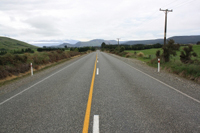It is easy to travel around in New Zealand due to its size. Within a few hours, you can make the journey from one city to another on either of the two main islands. But many roads have winding and uneven terrain that could pose a challenge for new drivers. Here are some driving tips for expats in New Zealand.
Eligibility
Expats who want to drive in New Zealand must have a current driver’s license. If the license is not in English, an approved translation or international driving permit is also necessary. This allows you to drive for up to 12 months from the date you arrive in the country.Those who will be staying for more than 12 months require a New Zealand driver’s license. Overseas licenses that are current or have expired less than a year ago can be converted into a New Zealand driver’s license through an application procedure.
Traffic rules
• In New Zealand, driving is on the left. Stopping or parking on the right side of the road is prohibited, unless it is a one-way street.
• The maximum speed limit on open roads is 100km/h and in urban areas it is 50km/h. On roads that have a Limited Speed Zone, the speed limit changes based on the conditions. It can be 100km/h in good conditions and 50km/h in poor conditions. These roads are usually found between towns and countries and many of them have already been replaced with 70km/h zones. Check the road signs for the legal speed limits, if in doubt.
• Drinking and driving laws are a serious matter and are strictly enforced.
• A safety belt is a must whether in the front or back seats, except in special cases such as when there are medical reasons or in certain antique cars. All passengers above the age of 16 must have their own seatbelts and it is the driver’s responsibility to ensure that children are safely restrained in child-approved restraints. Passengers who do not wear a seatbelt may be fined.
• On open roads, when overtaking make sure that there is a minimum of 100m of clear road before at all times. The double yellow lines on the roads mean that overtaking is too dangerous.
• Motorcyclists and cyclists must wear helmets at all times.
Road conditions
The roads in New Zealand are generally good, but newbies may take a while to adapt to the local terrain. Some of the highways can be narrow and hilly and even though most of the two-lane city roads are in good condition, there may be sharp curves along the way.
Auckland is the largest city in the country and the roads are congested especially at peak times. Even other big cities often encounter traffic jams at the peak hours of 8am and 5pm on weekdays. A drive from any major city to the airport can take an estimated 40 minutes to an hour at peak times and just 25 minutes at other times of the day. Drivers in Auckland also sometimes face the problem of early morning fog.
There are some one-way streets in the central business districts of many cities. These are not always indicated and hence drivers should exercise caution. The city of Wellington also has some bus-only streets. Drivers should also be aware that the curbs in Wellington are unusually high and this may cause some scraping of the undercarriage of the vehicle.
It is advisable to avoid leaving valuables, your passport, credit cards, electronics or cash on display in your car. New Zealand is known to be a friendly and safe place, but it is always better to take the necessary precautions. Also make sure to lock your car if you will be leaving it unattended for any period of time. In case of theft, report the matter to the nearest police station. You can also call the emergency phone number of 111 and speak to the police department.
Accidents
New Zealand law states that road accidents involving personal injury must be reported within the first 24 hours. This may be done at a police station or by calling the emergency number. Make sure to note down the details of the vehicles and the insurance company of the parties involved.

